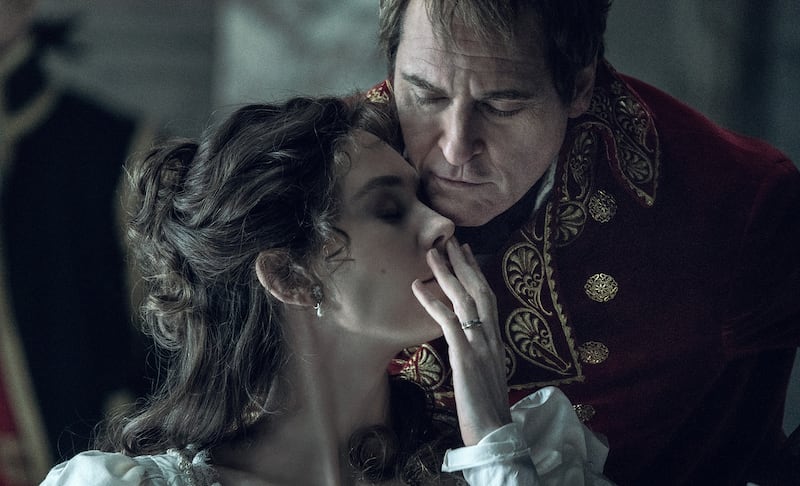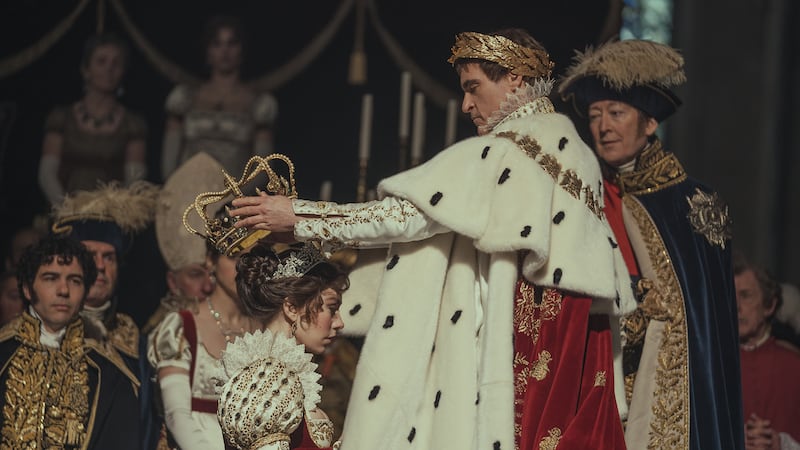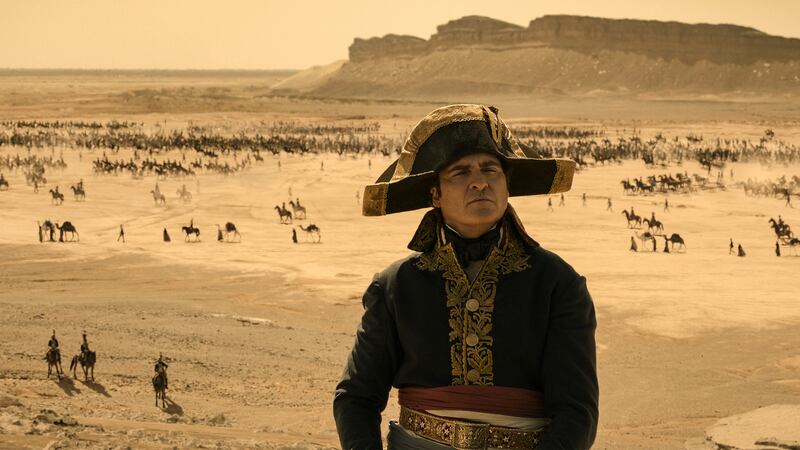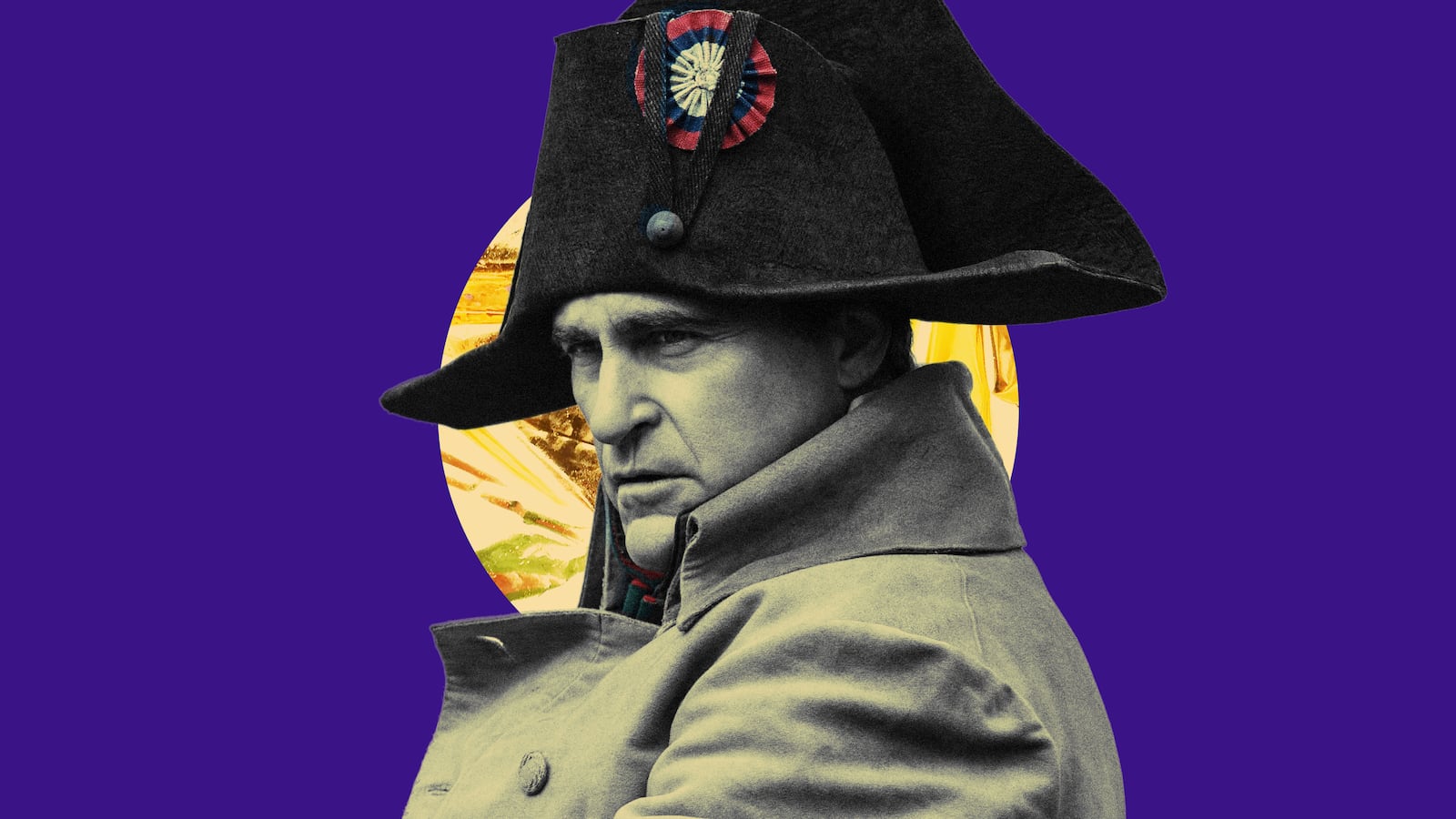Of the many criticisms lobbed at Napoleon Bonaparte, none hits the mark like the emperor’s portrayal in Leo Tolstoy’s War and Peace (1869). The Russian novelist had a habit of stripping characters down to their moral compass, and in the case of Napoleon, Tolstoy saw a manchild with no sense of truth or decorum.
As Napoleon readies his march to Moscow, Tolstoy calls him “spoiled,” “fat,” “befuddled with honors,” and a “so-called military genius.” Ouch. “It was clear that only what went on in his soul was of interest to him,” wrote Tolstoy. “Everything that was outside him had no meaning.” Russian realist burn—double ouch!
This weekend, director Ridley Scott leaps onto the dogpile of Napoleonic ridicule with Napoleon. And for an 85-year-old, the guy leaps pretty good. Napoleon won’t have the staying power of War and Peace, but it’s a gung-ho historical epic that goes from decent to great on the shoulders of Joaquin Phoenix, a man as destined for the role of Napoleon as Napoleon was for the Russian winter. Phoenix’s last 10 years have given us some of Hollywood’s most memorable loners, narcissists, and hypocrites. Pouting his way to the French crown, his Napoleon feels both believable and familiar, as if we’ve seen him at it before. That’s because Phoenix’s cinematic resume mimics the real-world French emperor in more ways than one.
“I awaken full of you…”
Napoleon’s meteoric rise to power produced a then-unrivaled dichotomy of political might and public caricature. Part of this had to do with the French Revolution and the unstable environment in which he came to kingship. Part of it involved the flukiness of his ascension. Mostly it reflected Napoleon’s character, for this was not your typical strongman.
At the age of 26, Napoleon Bonaparte patched up his deficient love life by writing a romantic novella entitled Clisson et Eugénie. He lived, per biographer Theo Aronson, “in a cheap Left Bank hotel.” Writing to his older brother Joseph, Napoleon said, “I hardly care what happens to me. I watch life almost indifferently. If this continues, I shall end by not stepping aside when a carriage rushes past.”
Hang on—have I misplaced my source material with Sartre? (Checks cover.) I have not! Ridley Scott chose to lampoon this version of Napoleon, the maudlin one. And he found his man in Joaquin Phoenix.
Phoenix polished his sad sack chops in Spike Jonze’s Her (2013) as Theodore Twombly, a languishing divorcee who writes other people’s love notes for a job. Twombly lives in a posh, somehow affordable apartment in near-future Los Angeles, where he plays video games, talks to his computer (a sultry ScarJo), and cries.

Vanessa Kirby and Joaquin Phoenix.
Apple TV+Unlike Napoleon, Twombly couldn’t fight his way out of a McDonald’s ball pit. But he channels the emperor in that both men are notoriously quick to love, regardless of what holes it might put them into (pun intended). Just as Twombly’s ex-wife knocks him for “dating his laptop,” the Bonaparte family never considered Josephine Beauharnais, a known mistress and widowed mother of two, proper marriage material.
As ScarJo with Twombly, the widow Beauharnais took advantage of Napoleon’s loneliness and beguiled every inch of him. “I awaken full of you,” he wrote her in a letter after they first made love. “Sweet and incomparable Josephine, what is this strange effect you have upon my heart?”
Napoleon trotted off on an Italian campaign a mere 36 hours after his and Josephine’s wedding, and for a time, the relationship—as was Twombly’s—was one of words. Despite this separation, “[Napoleon] was madly in love, in the full sense of the phrase,” wrote his aide-de-camp Auguste de Marmont. “Love so pure, so true, so exclusive had never possessed a man.”
Napoleon’s letters gained notoriety in Paris because Josephine, naughty naughty, handed them around her inner circle. “To live in Josephine,” declared the besotted Napoleon, “that is to live in Elysium. A kiss upon your lips, your eyes, your shoulder, your breast, everywhere, everywhere, everywhere!”
In such passion, pitfalls abound. When Napoleon, in Egypt, was informed of a rumor that his wife had slept with the officer Hippolyte Charles, the emperor’s secretary, Louis-Antoine Fauvelet de Bourrienne, described a scene not unlike what we’ve seen from Phoenix over the years: “[Napoleon’s] features were suddenly convulsed, a wild look came into his eyes, and several times he struck his head with his fists.”
He then looked up and asked, “Are these feelings even real, or are they just the programming?” Oh, wait wait, that was ScarJo.
“He remained awkward, provincial, Corsican…”
“Despite his exceptional mental qualities,” writes biographer Aronson, “the young Napoleon was ill at ease in general company. He remained awkward, provincial, Corsican.”
The Mediterranean isle of Corsica came under French control in 1769—coincidentally, the year of Napoleon’s birth. At this time, the Italian Buonparte family (Napoleon later Gallicized the name, removing the ‘u’) held but distant claims to aristocracy. None could have predicted their second son’s trajectory. The military historian Owen Connelly writes, “when Napoleon left Corsica for school in France, he hid his insecurities under a chip on his shoulder.”

Vanessa Kirby and Joaquin Phoenix.
Apple TV+In Napoleon’s first onscreen action sequence, director Scott sketches the inexperienced commander thus: as a bundle of nerves. Phoenix sweats, pants, and scrapes by with his life after his horse is struck by cannon fire in Toulon. After some 80 battles, the emperor likely overcame his battlefield timidity. But it never left him in the bedroom or in Parisian social circles. “[Napoleon] was still,” writes Aronson, “in spite of his brilliant intellect and his military successes, socially insecure. He felt tongue-tied in the presence of those actors and playwrights, contractors and stock-jobbers who made up [Josephine’s] circle.”
Phoenix does insecurity better than anyone, and returned to that well for this spring’s divisive Beau is Afraid. Beau Wasserman is so terrified of people—see title—that he won’t leave his apartment. Even the corner store is verboten. He’s eventually lured out, kind of, no spoilers, by his mother’s poor health. This is because Beau has mommy problems. Just like a certain French emperor.
“Loved, respected and above all feared,” writes the scholar Dorothy Carrington of Letizia Bonaparte, “she watched over her children with an inquisitorial eye, punishing the least fault, for this was her way of loving; her tenderness, said Napoleon, was ‘severe.’”
Director Scott highlights this relationship during an early Napoleon sequence, wherein Phoenix narrates a letter to his brother. “If we do not succeed,” he says, “our mother’s ambitions will be quashed.”
Was a tiger mom responsible for three decades of European land wars? It’s not out of the question. “None of [Letizia’s] other children responded so well to her teaching,” writes Carrington. “Napoleon was her masterpiece.”

Joaquin Phoenix.
Apple TV+“Kings are the slaves of history…”
The dope-smoking, huarache-wearing PI Doc Sportello, played by Phoenix in 2014’s Inherent Vice, seems to bear little semblance to a 19th-century European sovereign. Ever two steps behind the beat, Doc writes affirmations on rolling papers, speaks in non sequiturs, and botches every lead he receives.
Napoleon, a noted workaholic, would have honed his vocational approach in ways that Doc’s lifestyle never allowed. But both men are creatures of destiny, victims of machinations beyond their control. Doc gaffed his way into uncovering a hippie heroin smuggling ring, Napoleon into dissolving the Holy Roman Empire. There’s a difference in scope, but a common thread in execution.
As argued by Owen Connelly in Blundering to Glory: Napoleon’s Military Campaigns, the French emperor wasn’t so much a brilliant general as a beneficiary of circumstance. (Recall Tolstoy’s “so-called military genius” jab.) “He began many battles with a tactical error,” Connelly writes of Napoleon. Then, upon gaining his bearings, “[Napoleon] simply charged toward his enemy’s presumed location, often with only a vague idea of where he was.” The same can be said of Doc.
Connelly argues that, early in Napoleon’s career, he began fights with greater numbers than his enemy, and so won. Later on, “out of shape and out of touch with the army,” Napoleon had fewer numbers. So he lost. And was probably out of breath doing it.
If this sounds ungenerous, it is. But it’s the exact angle that Ridley Scott chose for Napoleon. By constructing the film’s climax around Waterloo, Scott argues that for all the emperor’s nominal success, his generalship never lived up to its billing. The director doubles down by tallying up Napoleon’s career casualties before the closing credits. Spoiler, it’s a lot.
Ridley Scott clearly had a bone to pick with Mr. Bonaparte. But why now? Why do we need another referendum on Napoleon when so many historians have already undercut his legacy? As Scott’s illustrious career draws to a celebrated end, the director seems to be addressing a Grand Question in the style of Tolstoy.
“Kings are the slaves of history,” wrote Tolstoy in War and Peace. “History, that is, the unconscious, swarmlike life of mankind, uses every moment of a king’s life as an instrument for its purposes.”
In Emperor Napoleon Bonaparte, Scott found a figure with which he could subvert the notion of power. And in Joaquin Phoenix, he hired an actor skilled enough to accomplish this subversion. I’m not sure that Napoleon accomplishes everything Scott set out to do, but I can say for certain that—as with 2019’s Joker—this movie would’ve been a disaster without Phoenix at the helm.







